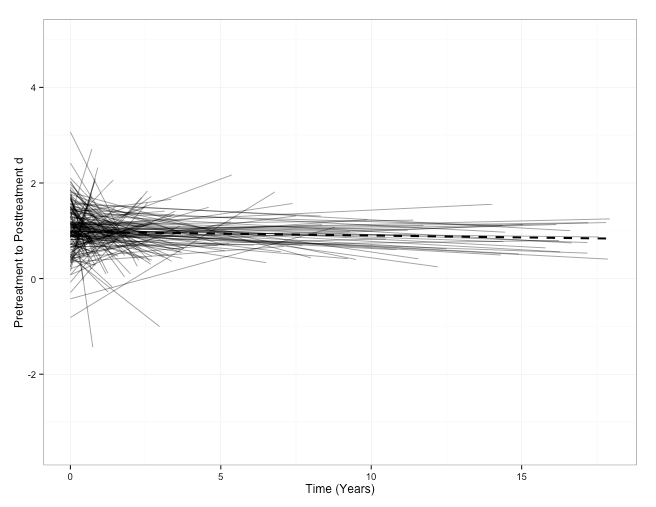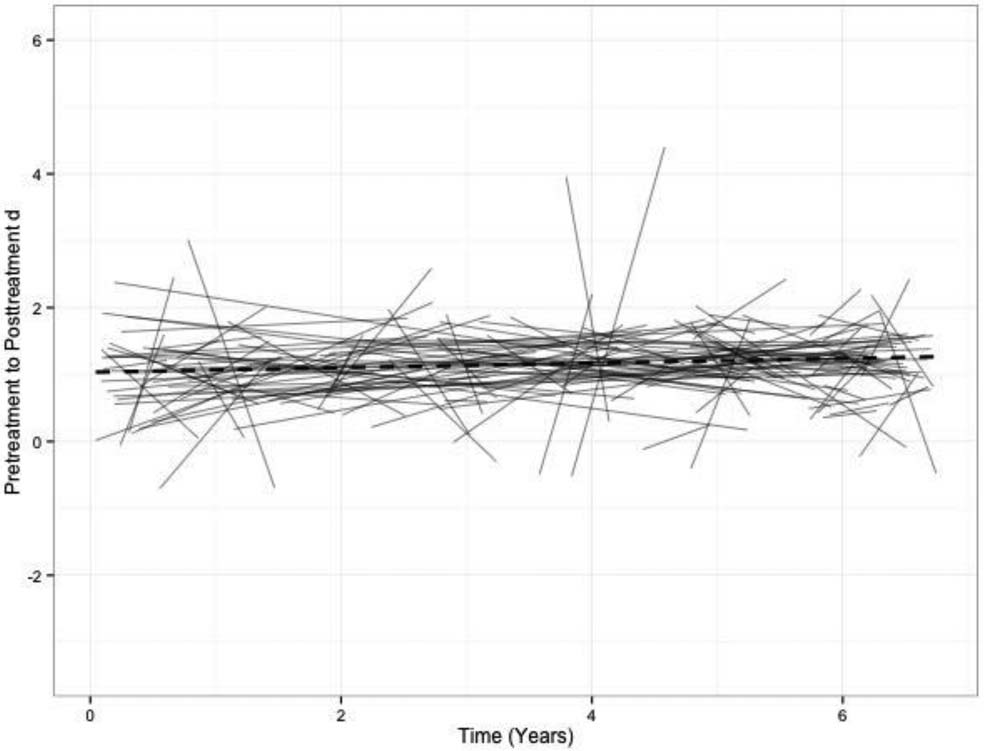Take a look at the figure to the right. 
It’s data taken from the largest study conducted in the history of psychotherapy research examining the relationship between experience and effectiveness.
Each of the smaller lines represents the outcomes of an individual practitioner followed, in some cases, over a 17-year period. The single, thicker, dashed-line plots the average across all, 170 practitioners in total–a group that measured the results of their work at every visit, with every client.
The data confirm what a host of correlational studies have hinted at since the mid-1980’s: in general, clinician effectiveness declines with time and experience.
 It’s not a steep slope, to be sure. It is slow and gradual, like a leak in a bicycle tire. Most problematically, other research shows, it’s also imperceptible. Indeed, as experience in the field grows, clinician-confidence increases, leading most to see themselves as more effective than their results actually indicate.
It’s not a steep slope, to be sure. It is slow and gradual, like a leak in a bicycle tire. Most problematically, other research shows, it’s also imperceptible. Indeed, as experience in the field grows, clinician-confidence increases, leading most to see themselves as more effective than their results actually indicate.
Now, consider the second figure. Once again, outcomes of individual practitioners are plotted.
Here, however, the slope is positive. In other words, therapists are becoming more and more effective over time. As before, the change is slow and gradual. Said another way, there are no shortcuts to improved outcomes. Slow and steady wins the race. More, unlike the prior results, therapists are both aware of their growth and, curiously, less confident about the effectiveness of their work.
Importantly, the data from the latter are not drawn from the application of some hypothetical, yet-to-be-hoped-for treatment model or training scenario. Indeed, they are from the only published study to date documenting the factors that actually influence development of individual therapist effectiveness. When employed purposefully and mindfully, clinicians improve three times larger than they were documented to decline in the prior study.
What are these factors?
As simple as it sounds: (1) measure your results; and (2) focus on your mistakes.
There is no way around this basic fact: any effort aimed at improving effectiveness begins with a valid and reliable estimate of one’s current outcomes. Without that, there is no way of knowing when progress is being made or not.
On the subject of mistakes, several studies now confirm that “healthy self-criticism,” or professional self-doubt (PSD), is a strong predictor of both alliance and outcome in psychotherapy (Nissen-Lie et al., 2015). Not surprisingly, therapist effectiveness improves in practice environments that provide: (1) ample opportunity and a safe place for discussing cases that are not making progress (or deteriorating); and (2) concrete suggestions for improvement that are tailored to the individual therapist.
Here are three, evidence-based resources you can tap in your efforts to improve your effectiveness in 2017:
- Begin measuring your results using two simple scales that have been tested in diverse settings and with a wide range of treatment populations. In 2013, they were approved by the Substance Abuse and Mental Health Services Administration (SAMHSA) and listed on the National Registry of Evidence-based Programs and Practices. Get them for free by registering for a free license here.
- For a limited time, I’ll send you a free copy of the “How to” manual for using the two measures. Just email me at: scottdmiller@talkingcure.com. Online, the manual retails for $24.95. It’s one of a series of 5, which SAMHSA gave perfect marks to as a support to implementation of routine outcome measurement in clinical practice.
- If you work alone or need a error-friendly practice community to discuss your work, join the International Center for Clinical Excellence. It’s our free, online community. There, you can link up with other like-minded clinicians, share your work, discuss your outcomes, watch “how-to” videos, help and be helped by practitioners around the world.
One final suggestion. Since “simple” does not necessarily mean, “easy,” join me in Chicago for one of our upcoming intensive trainings. Coming up in March is the “Advanced Intensive in Feedback Informed Treatment,” and the “Feedback Informed Supervision Intensive.” You’ll meet colleagues from around the world, learn from an international faculty, and leave with all the knowledge and skills you need to use outcomes to improve the quality and outcome of your practice or agency. The early bird rate is still available and we’ve only got a few spots left in each course.
Register by clicking on the text above or icons on the right side of the page.
Until then, best wishes for the New Year!
Scott
Scott D. Miller, Ph.D.
Director, International Center for Clinical Excellence


The results are not intuitive and somewhat scary. The question is how to reverse the trend.
I am wondering if the research results you share with us here about the effectiveness of therapists also could be suggested for leaders? Without research to back it up, my opinion is that it is very important also for leaders to engage in “healthy self-criticism and professional self-doubt. Could the two measures you present be used as well by leaders with their employees?
Thank you for the resources– they look very helpful. Research-based outcomes data is always appreciated. I look forward to reviewing them more in depth.
Thanks for these really useful tools. Not just useful for therapists but for researchers who are evaluating group training programmes that might be being delivered on multiple sites. Quick and easy to use.
Thank you, Scott, for the free manual. It will be very helpful in improving my therapeutic skills.
I continue to enjoy all the information you provide. After 40+ years in the profession, I have a real need to get out of my old habits. I have several of your books which I have read and refer to many times. It would be great to participate in all of the available training, but I am afraid I worked too long in agencies before finally moving to private practice. It has been slow going, but I am getting there. I have penciled your training in for 2018. Thanks so much for your help
any way to still purchase content from this webinar:
https://www.eventbrite.ie/e/fall-2016-feedback-informed-treatment-webinar-series-tickets-26431099129
This is an important theme in my practice. I often worry that I doubt myself too much, or that I might become complacent in my work. Whilst I think it’s important to keep these concerns ‘in check’, it’s good to think that they might, together with client feedback, be a valued resource. Great blog post!
I’ve followed you for years after seeing a presentation in North Carolina. I believe in the work your doing. The only problems is Chicago is way up north and far from the Sunny South. Hopefully you can find your way down here. Expense is a primary concern.
Thanks so much.
Keep up the good work.
Thanks Scott, that’s very thought-provoking.
I’ve always been a fan of healthy self-doubt in therapy professionals. Has anyone studied the difference between this and a more toxic kind of self-doubt?
Hi Scott
You’ve written that nothing improves therapist effectiveness. Not even supervision… But what if I measure my results and discuss cases with which I cannot move on my own with my supervisor? Both of us have attended your great FIT workshop in 2014 in Czech Republic and he is en expert 🙂
Many thanks for your generosity in providing your well researched tools to practitioners.
Outcome measures that help us improve effective treatment should be used by all practitioners interested in improving outcomes for their clients.
I always enjoy reading you blog I think that practitioners tend to focus more out the ‘outcome’ rather than the actual ‘process’, which to me is the key to learning.
Dear Scott,
Thank you for the manual!
As the manager of a psychoterapeutic out patient Clinic always very good to be reminded of the importance of creating an enviroment were difficult case can be openly disscussed!!
Thanks for the info in your blog and sending through the manual – much appreciated. The data you refer to makes me think about years of experience and burnout. I notice that the graph with a positive slope follows outcomes for up to 6ish years, but the one with a negative slope follows outcomes for up to 17 years. I wonder whether the nature of this work means that any therapist will find their outcomes deteriorate if they do this work for too long without sufficient time away?
I take your making the FIT manual available for free as additional evidence of your commitment to improving mental health services to benefit both clients and practitioners. Thank you Scott! And thanks also for all the work you’ve don’t to bring together an evidence based approach and a respectful, empowering, compassionate view of those we serve.
Thanks for the manual. There are lot of manuals/protocols that don’t work at all. This one does.
Scott, very many thanks for the manual. I’m really impressed by the level of detailed guidance, right down to the dialogues that we might have with clients. As a ‘how to’ it ticks all the boxes. What always throws me is the scoring though – I’m much more used to the CORE measures, where higher scores mean the client is getting worse and not better – small detail in the big scheme of things!
Cheers – Barry
Thank you so much for your outstanding and courageous commitment to improving the field for clinicians and patients and the organisations serving communities. Your work is elegant and accessible.
Thanks for the research and the resources. I am always wondering how effective I am and can be as a therapist. Using these resources will give me a better understanding of the work I am doing with my clients and give me much better insight into how they see therapy.
Thanks a lot for the manual Scott and for all that you do to improve the field. I look forward to start working with FIT.
All the best from Sweden!
Hi Scott,
Thank you kindly for the resources and for continuing to bring awareness to this hugely important but all too often overlooked area of psychotherapy. It continues to amaze me that such simple acts of measuring results, seeking feedback, and learning from the data are not routine practice.
Keep up the great work.
Matt
Thanks for these invaluable resources, Dr. Miller! The process of incorporating feedback-informed treatment methods into one’s practice for the first time can be a daunting task for both therapists and their clients, but your straight-forward tips and tools provide the clarity and confidence needed get started in this important aspect of our work. Looking forward to seeing how it improves patient care in my practice. Thanks again!